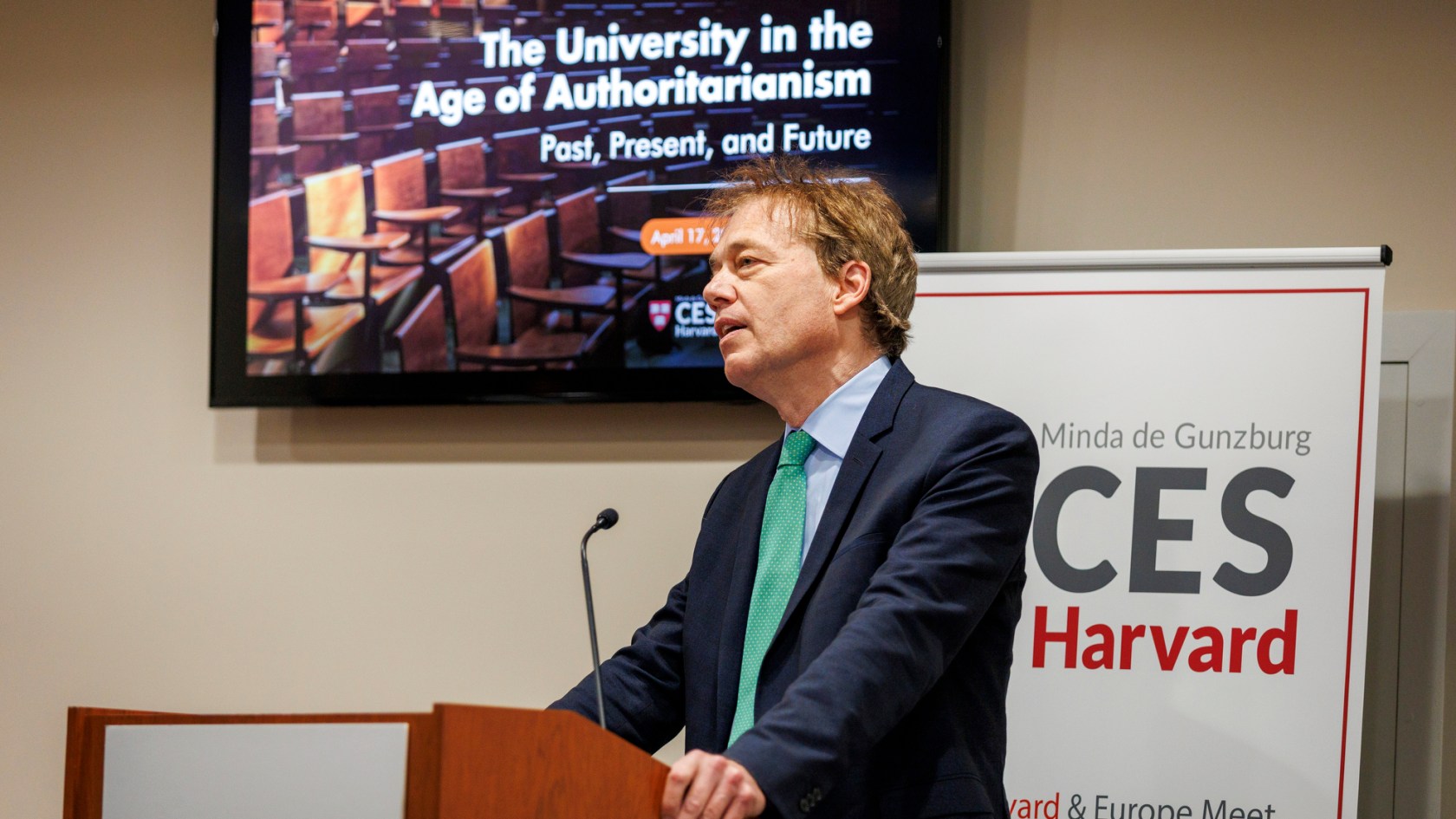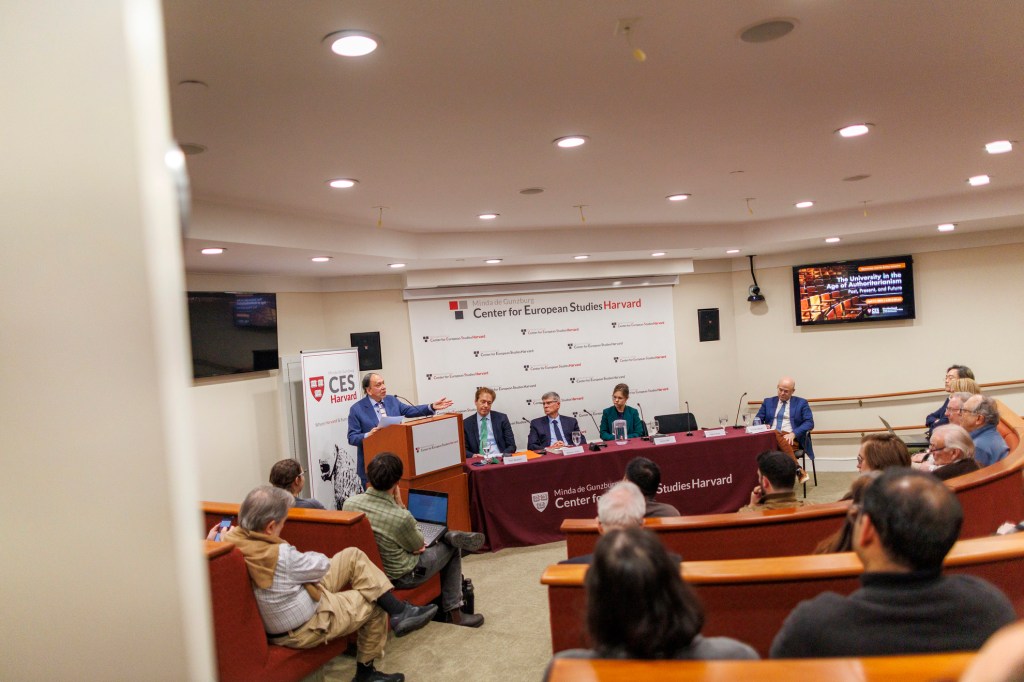When foreign governments took aim at universities
Scholars look to historical examples for insights amid current U.S. tensions

“Little did we know then how important this issue would become to the very institution in which we are meeting today,” said Sven Beckert.
Photos by Stephanie Mitchell/Harvard Staff Photographer
Recent government demands on U.S. universities have some scholars searching for the right historical analogue for insights.
“I’ve been thinking about this budding conflict between the state and universities as possibly a replay of the 1950s” and the McCarthy era, said William C. Kirby, T.M. Chang Professor of China Studies in the Faculty of Arts and Sciences and Spangler Family Professor of Business Administration at Harvard Business School. But, he suggested, events that occurred outside the U.S. provide more useful parallels.
Kirby and other Harvard faculty with expertise on higher ed crackdowns in various national contexts came together on a recent panel hosted at the Minda de Gunzburg Center for European Studies (CES). Stories emerged of governments in other countries muzzling student speech, placing universities under receivership, or hobbling institutions with bureaucratic red tape.
The event, offered as part of the center’s Democracy and Its Critics Initiative, had been in the works since December. “Little did we know then how important this issue would become to the very institution in which we are meeting today,” said moderator Sven Beckert, Laird Bell Professor of History.
The history starts in the heart of Berlin, began Kirby, author of “Empire of Ideas: Creating the Modern University from Germany to America to China” (2022). The University of Berlin, founded in 1810, was the world’s premier research university. It was the first dedicated to the creation as well as the transmission of knowledge. It pioneered the concept of academic freedom for students and faculty. It also placed liberal arts, rather than professional training, at its core.
“It became the model for all great research universities,” said Kirby, who served as FAS dean from 2002 to 2006.

As late as 1930, he noted, the University of Berlin — known today as Humboldt University — was the world’s most respected institution of higher learning. But its reputation collapsed with the rise of the Nazi movement, with its book burnings, mass firings of Jewish professors, and curbing of curriculum deemed insufficiently German.
Some of South Asia’s great universities were patterned after the University of Berlin, said panelist Sugata Bose, Gardiner Professor of Oceanic History and Affairs. He spoke of “the Humboldtian project” being implemented at his own alma mater — Kolkata’s Presidency College, founded in 1817 — “with later echoes in Dhaka, Lahore, Aligarh, Allahabad, and Bangalore.”
The decline of those situated in India started in 2016, Bose said, when supporters of Prime Minister Narendra Modi launched what he characterized as “an unbridled attack on India’s best universities.”
A former member of India’s parliament, Bose shared a clip from a speech he delivered to the chamber that year. At the time, students nationwide were demonstrating against caste discrimination. They adopted slogans broadly viewed as in opposition to the government.
“That was the first term of the Modi government,” he recalled. “It was still possible, standing in the Indian parliament, to offer principled opposition.”
For nearly a century, the strongest of India’s universities were funded directly by the central government, Bose explained. “Now it’s the central universities, such as Jawaharlal Nehru University or Hyderabad Central University, which are directly under the thumb of the central government.”
Also impacted are otherstate universities, now controlled by chancellors aligned with Modi’s Hindu nationalist Bharatiya Janata Party (BJP).
“The private universities and other autonomous institutes in the south of India are doing much better,” said Bose, noting a string of states in the region not controlled by the BJP. “These are the spaces for resistance and for standing up for the academic values, which sustain universities.”
Laura V. Jakli, an assistant professor of business administration at the Business School, outlined the recent assault on Hungarian universities. She recalled giving a lecture at Budapest’s Central European University (CEU) in 2017.
“At some point near the end, someone came up to me and whispered that parliament just passed something that might mean this university is no longer operational,” Jakli said. The student body wasted no time in taking to the streets to protest Lex CEU, an educational rule that effectively forced the U.S.–accredited CEU out of Hungary.
Subsequent measures by Prime Minister Viktor Orbán brought schools including the Hungarian Academy of Sciences and the University of Theatre and Film Arts, both in Budapest, under the control of foundations closely aligned with the Orban government.
The “note of hope,” said Jakli, is Hungary’s membership in the European Union. EU leadership has acted to curb these moves, by limiting funds to schools run by quasi-public foundations, for example. It also litigated Lex CEU before the EU’s Court of Justice, which struck down the rule in 2020.
But by then, Jakli submitted, “It was too little too late.” CEU had already relocated its core academic programs to Austria.
Kirby, a historian of modern China, took the conversation back to Asia for a final case study. During its late-Qing and Republican periods, China was home to an “extraordinary group of small universities,” he said. But these institutions were seized or shuttered after Chairman Mao Zedong and his Chinese Communist Party rose to power in 1949.
Kirby rattled off nearly a dozen examples — from Peking Union Medical College, usurped by the Communist Party in 1951, to Tsinghua University, its iconic gate toppled by the Red Army during the Cultural Revolution. The entire system was “Sovietized,” as Kirby put it, or retooled to train workers according to state priorities.
As the event wound down, one attendee raised the lack of hopeful examples. “We haven’t had a story of a successful rebuttal,” agreed Daniel Ziblatt, Eaton Professor of the Science of Government and director of the CES.
In response, Kirby steered the conversation in a surprising direction.
Today, he suggested, China’s research universities are skirting government control to reclaim some of the academic excellence of an earlier era. And institutions like Tsinghua University, in Beijing, have surpassed Princeton and Yale in at least one global ranking.
Tsinghua leaders officially tout “an education with ‘Chinese characteristics’ — whatever the hell that is,’” Kirby noted to laughs. “No one knows what it is. In fact, it’s just to appease the leadership.”




